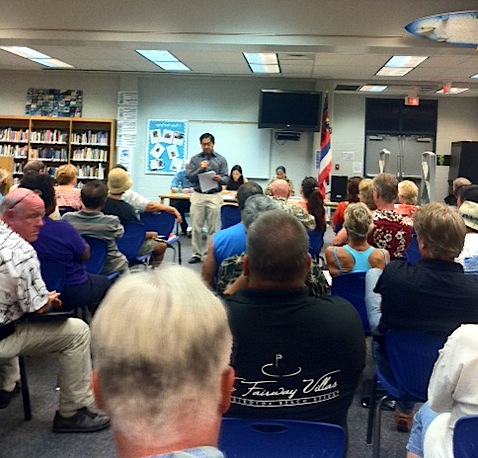Richard Ha writes:
The Kona PUC hearing we’ve been talking about here took place on Tuesday evening.
From West Hawaii Today:
Powerful resistance to PUC
By Erin Miller
West Hawaii Today
West Hawaii residents described to the Public Utilities Commission how they have cut back on energy usage, and questioned why Hawaiian Electric Light Co. shouldn’t have to bear the costs of upgrading its own equipment.
The questions continued as the PUC heard comments from residents Tuesday evening on a proposed contract between HELCO, Oahu’s Hawaii Electric Co. and Aina Koa Pono for a biodiesel project in Ka‘u.
Albert Prados, manager of the Fairway Villas at Waikoloa Beach Resort, was one of more than 20 people who testified against HELCO’s rate increase request, which HELCO officials would raise rates 4.2 percent, or about $8 per an average 500 kilowatt hour monthly bill. Prados described the measures he has taken in his own home, including shutting everything off except the refrigerator at night, to lower his electricity bill. Read the rest
Mayor Kenoi took a very strong stand on renewable energy. He
made clear that it is not sufficient that it be renewable; it also needs to be affordable. He is concerned about the most defenseless among us.
He said, This is the kind of project that 20 years from now, we will be asking, “How did we let that happen?” He also said that we are doing this for the benefit of HEI and HECO – but that there is no benefit for the Big Island. The Mayor is very aware that high and rising electricity costs threaten our economy and also the folks on the lowest rungs of the economic ladder.
Rep. Denny Coffman asked, “How is it we are here? This is not even proven technology.” He pointed out that the electric utility is setting the state’s energy policy, and that that should stop while we finish the Integrated Resource Planning process that’s happening right now. Rep. Coffman understands the energy situation worldwide and he knows it’s foolish to be chasing unproven technology. It is both a waste of time and money. In Hawai‘i, we do have proven technology that is affordable.
My testimony:
To answer the Consumer Advocate’s question, “Would we change our minds if all the costs were given to the Oahu rate payers?,” the answer is no! I think that giving AKP a 20-year contract will forego the opportunity of developing lower cost alternatives. And it will take up valuable time. Liquid natural gas is an option. Ocean energy might be ready within the 20-year period. Geothermal is an affordable, proven technology. For instance, there is an 11 cent difference between geothermal and oil today. We could replace liquid fuels with 80MW of geothermal electricity, and apply that savings to pay the remaining debt of the Keahole 80 MW liquid fuel burning plant.
(80 MW is equal to 80,000 kilowatts. That 11 cents/kilowatt hour savings multiplied by 80,000 kilowatt hours equals $8,800 that you save each hour. And the savings per day is $211,200. That times 365 days equals an annual savings of $77 million. That is enough to write off the plant and still give the rate payers a break.)
Most of the time, making electricity has to do with making steam to turn a turbine. You can burn coal to make steam, or you can burn oil to make steam. You can burn firewood to make steam, or use the steam from underground – that’s geothermal.
AKP takes the long way. They grow plants using fossil fuels,
then they use electricity to make microwaves to vaporize the plants, then take the liquid that rises and convert it to a burnable liquid, and haul it to Keahole, where they burn it to make steam.
It isn’t surprising that it is expensive.
More than a few engineer folks tell me that this process
uses more energy than it makes. And if that is the case, it will always be more expensive than oil. This is not a good bet for us.
Palm oil is the only biofuel today that can compete heads up
with petroleum oil. It produces 600 gallons of oil per acre. AKP strives to produce 16 million gallons per acre, plus another 8 million gallons – or 24 million gallons from 12,000 acres. That is 4 times as productive as palm oil, the only biofuel that competes straight up with petroleum oil. If it works, they don’t need any subsidy from us. If it works, they will all end up billionaires.
We cannot predict the price of oil. But people are hurting right now. And if oil prices reach $200 per barrel, the tourism industry will be devastated and everything connected with it will shrink. We do not have the luxury of time. We need a lower cost alternative right now.
Well-respected Council of Revenues economists Paul Brewbaker, of TZE Economics, and Carl Bonham, Executive Director of the
University of Hawaii Economic Research Organization (UHERO), agree that low-cost energy is a key component of our economic future.
There are alternatives to $200/barrel biofuel. Geothermal is the equivalent of $57/barrel. Liquid natural gas is low cost now on the
mainland, and maybe ocean energy will be an alternative within the time period of the contract.
We need lower cost electricity, not higher, and AKP is not the answer. The AKP project is wasting valuable time, and we need to put it to bed so we can focus our attention on the next projects.
I agree with the electric utility from here forward. The next PUC hearing will be on the Hu Honua biomass plant at Pepe‘ekeo. They will use wood chips to boil water and make steam. This is proven technology and it looks to be cost effective.
After that will be a proposal for 50MW of geothermal. Geothermal does not have to burn anything. It just uses the steam underground to make electricity and it is cost effective.
At that time, HELCO with its leverage should be able to successfully renegotiate the old contract that is tied to oil. Then we will be well on our way to protecting ourselves from the volatility of world oil prices. Those two projects will result in a total of 110 MW of stable, affordable electricity using proven technology.
We need to strive for balance and common sense as we try to make things work for everyone. Hospitals, schools, hotels and businesses need the electric services provided by the grid. Fifty percent of our people rent and so cannot get off the grid. We need to be practical, and help to make sure the electric utility is healthy as we strive for a lower cost to the rate payer.


